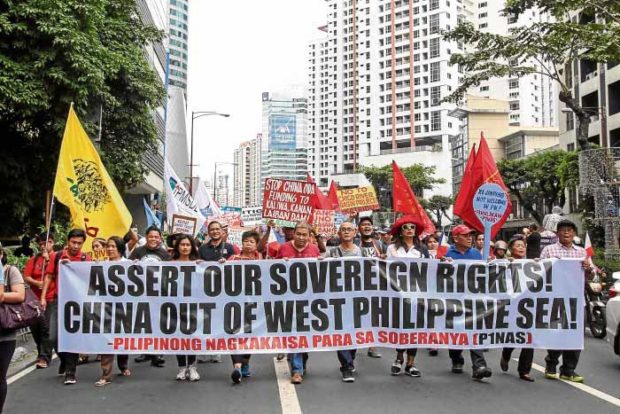Protesters slam Beijing for militarizing disputed islets

MAKATI MARCH Militants march to the Chinese Consulate in Makati City ahead of the arrival of Chinese President Xi Jinping on Tuesday, demanding that China vacate contested islets in the West Philippine Sea. —EARVIN PERIAS
As soon as he stepped off the plane, visiting Chinese President Xi Jinping on Tuesday drew protests in the streets of Manila and on social media amid growing resentment over China’s militarization in the South China Sea.
Leaders of the militant Bagong Alyansang Makabayan (Bayan) and Pilipinong Nagkakaisa para sa Soberanya (P1nas) took turns in denouncing China’s construction of military fortresses on islands claimed by the Philippines and other countries in the disputed sea.
“Xi Jinping not welcome here. Philippines is ours; China get out of our land!” they shouted in a rally outside the Chinese Consulate in Makati City.
“The Philippines is not for sale, Mr. Xi Jinping. You can bribe the government, you can use your military might to illegally occupy our seas, but we will continue to assert our sovereignty and demand that you get out of the West Philippine Sea,” said former Rep. Neri Colmenares, a P1nas convenor.
Int’l tribunal ruling
Many Filipinos resent Beijing’s claim over most of the South China Sea, which an international tribunal ruled in 2016 was without basis.
The dispute led to a freeze in Beijing-Manila ties, but all that changed when President Rodrigo Duterte formally assumed power shortly before the judgment was handed down.
The President has opted to set the key ruling aside in order to pursue billions in trade and investment from China, which many Filipinos see as a frittering away of territory that is rightfully theirs.
A fisherfolk group, Pamalakaya, also warned that a deal between Manila and Beijing to explore oil and gas in the international waterway could lead to China’s “takeover” of the Philippines’ exclusive economic zone and extended continental shelf.
“It is nothing but another face of Beijing’s territorial expansion and occupation under the pretext of boosting the China-Philippine economic ties,” Pamalakaya national chair Fernando Hicap said.
“It is not a joint venture but exclusive exploitation of China brought about by the subservience of the Duterte government to the demands of its Chinese masters,” Hicap said.
Bayan secretary general Renato Reyes raised concerns over the raft of agreements signed by Philippine and Chinese officials.
“We must be wary of the strings attached in any economic agreements. Terms and conditions in loan agreements must be disclosed by government and scrutinized by the people,” Reyes said.
Winnie the Pooh
Philippine Twitter and Facebook feeds were flooded on Tuesday with Winnie the Pooh memes in a winking expression of anti-China sentiment stirred by Xi’s two-day state visit.
The self-described “bear of very little brain” has been used in the past on social media to poke fun at portly Xi, a joke that has drawn crackdowns from Beijing’s censors.
In one clip posted, Pooh bows before a mirror while “Hail Satan” flashes across the screen. In another, he floats near an artificial island built by Beijing in the disputed South China Sea.
“Because Winnie the Pooh is banned in China because he’s the spitting image of Xi Jinping, let’s protest his presence by posting memes and photos of him with his (look-alike),” Facebook user Wilfredo Garrido wrote. —With a report from AFP














